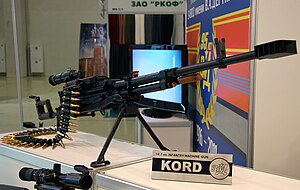The Kord-12.7 mm heavy machine gun is a Russian design that entered service in 1998[3] replacing the older NSV machine gun. Externally the weapon resembles the NSV; however, the internal mechanism has been extensively reworked, changing from a horizontally pivoting breech block to a rotating bolt design.[3] Additionally the gas system has been changed and the muzzle baffle redesigned. These changes give the weapon reduced recoil compared with the NSV, allowing greater accuracy during sustained fire.
| Kord 6P50 | |
|---|---|
 Kord machine gun with a scope and 12.7x108mm rounds on belt displayed at the Interpolitex-2011 | |
| Type | Heavy machine gun |
| Place of origin | Russia |
| Service history | |
| In service | 1998–present |
| Used by | Russian Army and Police (MVD) |
| Wars | |
| Production history | |
| Designer | A.A. Namitulin, N.M. Obidin, Ju.M. Bogdanov and V.I. Zhirokhin[1] |
| Designed | 1990s |
| Manufacturer | V.A. Degtyarev Plant |
| Produced | 1998–present |
| Variants | 6P50-1, 6P50-2, 6P50-3, 6P49 |
| Specifications | |
| Mass | 25.5 kg (56.22 lb) (6P50) 32 kg (71 lb) (6P50-1) 60 kg (130 lb) (6P50-2), 80 kg (180 lb) (6P50-3), 27 kg (60 lb) (6P49) |
| Length | 1,980 mm (78.0 in) (6P50-1, 6P50-2, 6P50-3) 1,625 mm (64.0 in) (6P49) |
| Barrel length | 1,070 mm (42.1 in) |
| Cartridge | 12.7×108mm 12.7×99mm NATO (export)[2] |
| Action | Gas-operated, rotating bolt |
| Rate of fire | 600–650 rounds/min |
| Muzzle velocity | 860 m/s (2,821.5 ft/s) |
| Effective firing range | 2000 m |
| Feed system | 50-round linked belt |
| Sights | Iron sights |
Development
editThe catalyst for the development of the weapon was a complete lack of any heavy machine guns in construction at that time in the Russian Federation. Prior to the dissolution of the Soviet Union, the weapon that had functioned as the heavy machine gun was the NSV, or "Utyos" ("утёс", meaning one lonely cliff in Russian, this name was its designation during development)[4] machine gun. The main production centre for the NSV was located in what is now Kazakhstan.[3]
The Russian Degtyarev bureau was given the job of producing an updated version of the weapon chambered in the 12.7×108mm cartridge, which could be used for support, mounted on vehicles or in an anti-aircraft capacity. All variants of the weapon are also available chambered in the .50 BMG (12.7×99mm NATO) cartridge for export sales.[2]
The weapon employs new construction, and consequently is significantly lighter than its predecessor. The firing mechanism is very rugged, and is capable of a greater rate of fire and significantly less recoil. Because a new barrel made of a high-tech alloy minimizes distortion and drop, accuracy has increased tremendously over previous Soviet machine guns. Unlike its predecessor, it may be fired from a bipod; a rather unusual feature for 12.7 mm/.50 caliber heavy machine guns. Its relatively light weight and lesser recoil allows stronger soldiers to move the gun around without assistance.[5]
Variants
edit- 6P49: Baseline variant for vehicle mounting.[3]
- 6P50: Basic infantry version.[3]
- 6P50-1 (6P57): 6T19 Bipod-mounted infantry version. Bipod provides ±15° range of traverse.[3]
- 6P50-2 (6P58): Infantry variant.[3]
- 6P50-3 (6P59): Mounted on boats, sea-going ships, and stationary objects on a 6U16 multipurpose mount. Casing ejection is to the right side.[3]
- 6P51: Co-axial version with left-hand feed system and forward casing ejection.[3]
Remote weapon stations
edit- 6C21 is a Russian remote weapon station using Kord machine gun or PKMT machine gun.[6]
Combat history
editThe Kord machine gun was used by the Russian forces in 1999–2000 during the Second Chechen war and in 2008 during the Russo-Georgian War.[7] It later saw action in the Russo-Ukrainian War[7] and in the Syrian Civil War.[8] 6P67, 6P68, 6P69 versions entered service in 2019.[9]
Users
editGallery
edit-
6P49
-
6P57
-
6P60
See also
editReferences
edit- ^ Fofanov, Vasiliy (2000–2007). "KORD 12.7MM HMG". fofanov.armor.kiev.ua. Archived from the original on 27 May 2015. Retrieved 14 June 2015.
- ^ a b "12.7 mm Kord tank mounted machine-gun (index 6P49 (6P51))". zid.ru. V.A.Degtyarev Plant. Archived from the original on 5 November 2020. Retrieved 20 January 2021.
- ^ a b c d e f g h i Jane's Infantry Weapons 2005-2006.
- ^ Modern Firearms - NSV-12.7 machine gun Archived 24 October 2007 at the Wayback Machine
- ^ Russian Udarnaya Sila TV show, excerpt showing Russian officer firing Kord from the hip while moving [1] Archived 13 January 2017 at the Wayback Machine
- ^ "JSC CRI "Burevestnik"/ 6S21 WEAPON STATION". Archived from the original on 19 October 2017. Retrieved 29 October 2017.
- ^ a b "'Novorossia' Exposes Russia: Russian Pecheneg Machine Gun, Kord Machine Gun, and Command Vehicle". Inform Napalm. 1 June 2015. Archived from the original on 4 February 2019. Retrieved 4 February 2019.[better source needed]
- ^ a b "Russian Kord and ASVK systems in Syria". armamentresearch.com. 30 November 2014. Archived from the original on 17 July 2015. Retrieved 28 July 2017.
- ^ "Archived copy". Archived from the original on 25 August 2021. Retrieved 31 December 2019.
{{cite web}}: CS1 maint: archived copy as title (link) - ^ Finnish Army HQ Materiel Department decision MI37585/27.12.2012 (Päätös MAAVEMATOS ak MI37585/27.12.2012)
- ^ "Namibia receives Russian small arms". defenceweb.co.za. 1 June 2016. Archived from the original on 23 September 2018. Retrieved 22 September 2018.
- ^ "Танкисты ЮВО отрабатывают элементы танкового биатлона на полигоне в Краснодарском крае". structure.mil.ru (in Russian). 11 January 2016. Archived from the original on 30 July 2017. Retrieved 28 July 2017.
- Koll, Christian (2009). Soviet Cannon—A Comprehensive Study of Soviet Arms and Ammunition in Calibres 12.7mm to 57mm. Austria: Koll. p. 70. ISBN 978-3-200-01445-9.
External links
edit- V.A. Degtyarev Plant – official site
- Modern Firearms
- Image of Kord on Tripod
- «KORD» large caliber machine gun